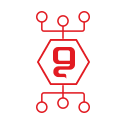Comparison test: Google apps VS Office 365
introduction: As we all already know and are used to, today everything is moving to cloud computing, and every business (whether it is a large organization or a small company), knows that it is worth investing in backing up the systems and data of its organization in a way that secures and backs it up in any situation. The two most common and best-known products in the cloud computing market come from two giant companies that dominate the field of technological development: Google and Microsoft.
Google's product versus Microsoft's product can look the same, but it is important to know that there are fundamental differences between the two products. Both companies tempt us, the potential users, to believe in their product - but how do we know which is best for us?
Google apps or Office 365?
Google APPS is a service that allows organizations, companies and businesses to connect to the management interface of Google Online through the domain name of your business. Office 365 is a management interface where you can adapt the tools that suit your needs, and work on them also in an offline configuration.
Previous acquaintance with the product:
The clear advantage of Office over Google is the seniority of the company. There is no need to learn to use Microsoft's interface, we all know its products and use them on a daily basis. From a child in elementary school writing a root thesis, to a senior project manager at a huge company entering data into a tracking table.
The flexibility of the product according to the customer:
The application interface that Google offers comes in one clear template, where you can choose what to use and which of the functions to give up. Microsoft's interface adapts itself flexibly to each client according to his needs, in a way that serves the client to do his job to the best of his ability.
What happens if the connection to the network is interrupted?
Another and no less important advantage is the fact that you can work on Microsoft's interface offline and still back up the work and data you entered, while Google's interface only functions if there is a WI-FI connection available in the area.
What is the size of my business?
Before we start checking which of the two products suits us best, it is important that we define our needs. In a Microsoft product, the interface can change according to the customer's requirements, which can be a huge advantage over Google's product, so it is worthwhile and even recommended to check before purchasing:
What is the size of your business?
small business
Microsoft offers small business owners a basic package that includes an email address, a meeting calendar, and business-level security. In addition, there are various functions in the product that can make life a little easier for you and your employees: online editing of shared documents, easy and convenient access to the interface via smartphone, sharing of your desktop, and more.
Medium-large organization
Microsoft are very friendly to different types of businesses, and adapt their interface according to the individual needs of each customer. Among other things in this package they offer: high-level security services (including data recovery), technical service around the clock 24 hours a day, 7 days a week, a different administrative approach for those in positions in the organization, and more.
Mailboxes
Another and most important comparison that should be made between the two products is the mailbox, its size and its interface to Outlook (if necessary).
In the Microsoft mailbox:
The mailbox has a volume of 25GB, contains different work options: via the network or offline with local Outlook, has a full synchronization function for all mobile phones, access to mail from anywhere. Saves purchasing external security, because it contains built-in anti-virus and anti-spam. Microsoft's mailbox also has advanced management capabilities for the administrator (who is defined as an administrator or has administrative access in the interface) and rich management capabilities for the calendar such as: sharing events, granting permissions on behalf of contacts, corporate phone book, and more.
In the Google mailbox:
Google's mailbox syncs with Outlook, but to sync events and contacts you need to install an additional app on your desktop. You can access the mailbox from anywhere, as well as the meeting calendar, document sharing, and more. The security of information in Google's cloud computing applies to emails in its mailbox and events only. If you want to secure additional data, you will have to do it manually.
You may be interested in:

אירוע משפחות סוף קיץ 2025


פישינג בעסקים: איך לזהות, למנוע ולהגיב נכון


החשיבות של סריקות פגיעויות באבטחת סייבר






